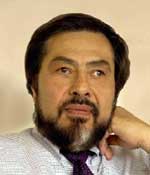View from the Chair
William Barletta

Changes
The New Year brings with it changes to our Executive Committee. Noémie Koller has completed her service in the Chair line. Join me in thanking her for her leadership and wise counsel. Likewise Susana Hernandez and Marie-Louise Saboungi have completed their terms as Members-at-Large of the Executive Committee. We thank them for their service to FIP and will welcome their continued advice.
Last year's elections brought us new EXCOM members. We welcome our Vice Chair Esen Ercan Alp and two new Members-at-Large, Sultana Nahar of the Ohio State University and Luisa Cifarelli of the University of Bologna and President of the European Physical Society. Luisa's presence on our committee offers us a special opportunity to strengthen ties with our colleagues in the EPS.
March meeting highlights
The APS annual meetings will soon be upon us. In FIP as in many other units, the Chair Elect is responsible for organizing the invited sessions at the March and April meetings of the following year. To boost the visibility of our sessions this year, FIP has partnered with other APS units to bring a rich and varied set of topics to the meeting attendees.
The March meeting will have five invited sessions, sponsored or co-sponsored by FIP. The 2012 Sakharov prize winners, Richard Wilson of Harvard and Mulugeta Bekele of the University of Addis Ababa are being honored for their "tireless efforts in defense of human rights and freedom of expression and education anywhere in the world, and for inspiring students, colleagues and others to do the same." Wilson will speak at a session devoted to the life and intellectual heritage of Andre Sakharov. This session, co-sponsored with the Division of Physics of Beams (DPB) includes talks by Bruno Coppi, Robert Cahn, Yousef Makdisi, and Sakharov's daughter, Tatiana Yankelovich. Bekele has been asked to give his prize lecture at a second session co-sponsored with DPB, "Science Diplomacy: Physics in Africa and the Middle East." Other speakers at that session include our FIP Councillor, Herman Winick, Sekazi Mtingwa, Christine Darve, and the 2012 Marshak Lecturer, Ömer Yavas of the Turkish Accelerator Center.
Energy supply and use is of keen interest to many of us and will be the focus of two of our sessions. With the Topical Group on Energy Research and Applications (GERA), we will sponsor the session, International Energy Perspectives. Speakers include Deputy Assistant Secretary of Energy, Carmine Difiglio (Economics of Energy Alternatives). Other talks are "Energy Perspectives in China" (M. Levine), the "Science Basis of Sustainable Energy" (A. Malazanoff), "Fuel from Sunlight" (E. Stechel) and "Future Trends in Nuclear Power" (R. Lester). The future of nuclear power after Fukushima will be the topic of an entire session jointly sponsored by the FIP, the Forum on Physics and Society (FPS), and the Division of Condensed Matter Physics. A review of "What Happened at Fukushima" (A. Omoto) will be followed by talks about improving reactor safety and perspectives on nuclear power in the US, China, and India. Rounding out our contribution to the March meeting will be a session devoted to the NSF Partnerships for International Research and Education (PIRE). The session will feature five technical talks about programs sponsored by PIRE grants. March is also the occasion for the FIP reception to be held on Tuesday evening in the Hancock Room - Westin Boston Waterfront starting at 6:00 pm. Please join us there.
April meeting highlights
At the annual April meeting FIP will have four sessions, all co-sponsored with other units. Two of these sessions, organized in collaboration with GERA, will focus on Energy Technologies for Developing Countries. Session I will offer three presentations on energy efficient heating, cooking, and lighting systems. Session II will offer talks about cost-effective, distributed energy supply and storage. We will continue our science diplomacy series, this time focusing on "Accelerator-based Science in Korea." The program, co-sponsored by the DPB, will feature the Beller Lectureship winner for 2012, Dongpil Min speaking about the KoRIA project for rare isotope production and acceleration. Lectures about new photon science facilities and industrial uses of accelerators complete the program. The last collaboration is with the Forum on Graduate Student Affairs to offer a panel discussion of issues faced by students and post-docs participating in international collaborations.
Freedom and safety of scientists
Unfortunately the freedom and safety of our scientific colleagues worldwide must remain an issue of our attention and concern. Freedom-of-inquiry remains one of our core values. The past year has witnessed imprisonment of scientists under politically motivated charges and extra-judicial assassination; these actions violate our deepest sense of human rights. I urge our members to become aware of the activities of the APS Committee on International Freedom of Scientists. Yet as we mobilize to aid our fellow scientists, we should recall that such actions are no less tolerable when the victims are from outside of our international scientific community.
A reawakening
I was pleased that in 2011, I along with the Directors of the CERN Accelerator School, the Russian School at Novosibirsk and the KEK School held a successful session of the Joint International Accelerator School (JAS) after a several year hiatus. The venue for the session was the Ettore Majorana Center for Scientific Culture in Erice, which generously made available several scholarships for students from developing countries. The Asian Committee on Future Accelerators has very recently accepted the proposal from KEK to hold the next JAS session in Japan in 2013.
The author, our FIP Chair, is Director of the US Particle Accelerator School, Visiting Professor in the Faculty of Economics of the University of Ljubljana, Coordinating Editor, Nuclear Instruments & Methods, and Adjunct Professor at MIT and UCLA.
Disclaimer—The articles and opinion pieces found in this issue of the APS Forum on International Physics Newsletter are not peer refereed and represent solely the views of the authors and not necessarily the views of the APS.
